A change to state law this year could make it easier for Indiana’s charter schools to acquire buildings from school districts by targeting those that are losing students and have schools that are nearly half empty.
The change means that the Indiana Department of Education can now force school districts that have lost at least 10% of their enrollment in the past five years to close schools that have been operating at less than 60% capacity and sell or lease them to charter schools for $1.
Lawmakers approved the revision to the state’s so-called “$1 law,” which has been on the books for years and requires school districts to make certain buildings previously used for classroom instruction available to charter schools at next to no cost. It’s the state’s latest attempt to provide help for charter schools that frequently have problems finding buildings to use. But some charters might not have much time to take advantage of it.
The previous version of the law, which deemed “vacant” or “unused” classroom buildings available for purchase, largely did not prove successful for charters. School districts argued that they were still using or planning to use the buildings they had closed for instruction. The attorney general’s office ruled in favor of districts eight out of the nine times it investigated allegations that districts were violating the $1 law.
The new version of the law targets districts with declining enrollment like the South Bend Community School Corporation and Indianapolis Public Schools, which had an average building utilization rate of 60% in 2021-22.
It’s unclear how many charter schools may take advantage of the new law, or how districts will respond. IPS, for example, said in a statement that it’s still examining the new law to understand its impact.
Republican Sen. Linda Rogers, who wrote the language in Senate Enrolled Act 391 that changed the $1 law, said she believes the change will bolster fiscal responsibility.
“Trying to be understanding and create a balance between traditional publics and charter schools is my goal,” she said. “The taxpayers paid for these buildings to educate the community’s children.”
Districts with declining enrollments must also review the utilization rates of their buildings and share it with the state department of education annually. Charter schools must work with districts to try to reach a deal to acquire or lease a building.
If they can’t reach a deal within 45 days, a charter school can petition the department to determine whether the building meets the criteria for closure. The department can order a school to close, and if needed, the department can request the attorney general to enforce the order to close the school.
Rogers, however, noted that the department can consider a school’s unique circumstances when deciding whether it must be sold or leased.
The department could soon release guidance to school districts about the revised law’s impact.
However, school districts that share revenue from property tax increases for operating or safety costs, which voters would pass through a ballot question, are also exempt from the law.
That exemption could significantly reduce the impact of the new $1 law in Lake, Marion, St. Joseph, and Vanderburgh counties. That’s because, under a separate change to state law enacted this year, districts in those counties must share such tax revenues from future ballot questions.
All of that means charters in these four counties might have a limited window of time to acquire underused buildings. In other words, once a district with declining enrollment in those counties gets a ballot measure passed for operating or safety costs, they’ll no longer have to make underused buildings available to charters under the $1 law.
In January, the IPS school board tabled its plan to ask voters for a tax increase this year to fund its Rebuilding Stronger revitalization plan for academics and grade reconfigurations. It remains to be seen if IPS will revive that plan.
Districts like IPS and South Bend aren’t the only ones that could be affected by the new $1 law.
Elkhart Community Schools in Elkhart County, for example, has lost 12% of its student population from 2018 to 2023, according to state data. And Brown County School Corporation has lost 17% of its enrollment from 2018 to 2023. Now, those districts will be required to report the usage rates of each of their buildings, information that charters looking for space could find useful.
Charter schools, districts examine new law
Charter schools aren’t necessarily leaping at the change to try to take control of buildings under the new $1 law.
Tommy Reddicks, the CEO of Paramount Schools, which has three locations in Indianapolis and is opening another in South Bend in a former district elementary school building, said the charter network does not have an interest in taking advantage of the new law just yet.
“We’ll likely keep an eye on it and see how it is utilized in the coming years,” Reddicks said in an email.
Rafi Nolan-Abrahamian, chief of staff for South Bend Community Schools, said the district has six or seven buildings that may fall under the law’s definition of underutilized. But South Bend, like IPS, is undergoing a massive reorganization to address a loss of enrollment that he said will close some schools but lead others to operate at closer to full capacity.
He said he doesn’t expect the new law to result in any forced closures. Instead, he said, the new law — and the requirement for South Bend to share future referendum dollars with charter schools — could foster increased collaboration between the district and charters.
“Should the district pursue another referendum after the expiration of our current operating referendum, we’re certainly hopeful that we can work together with other public schools in the area,” he said.
Amelia Pak-Harvey covers Indianapolis and Marion County schools for Chalkbeat Indiana. Contact Amelia at apak-harvey@chalkbeat.org.






